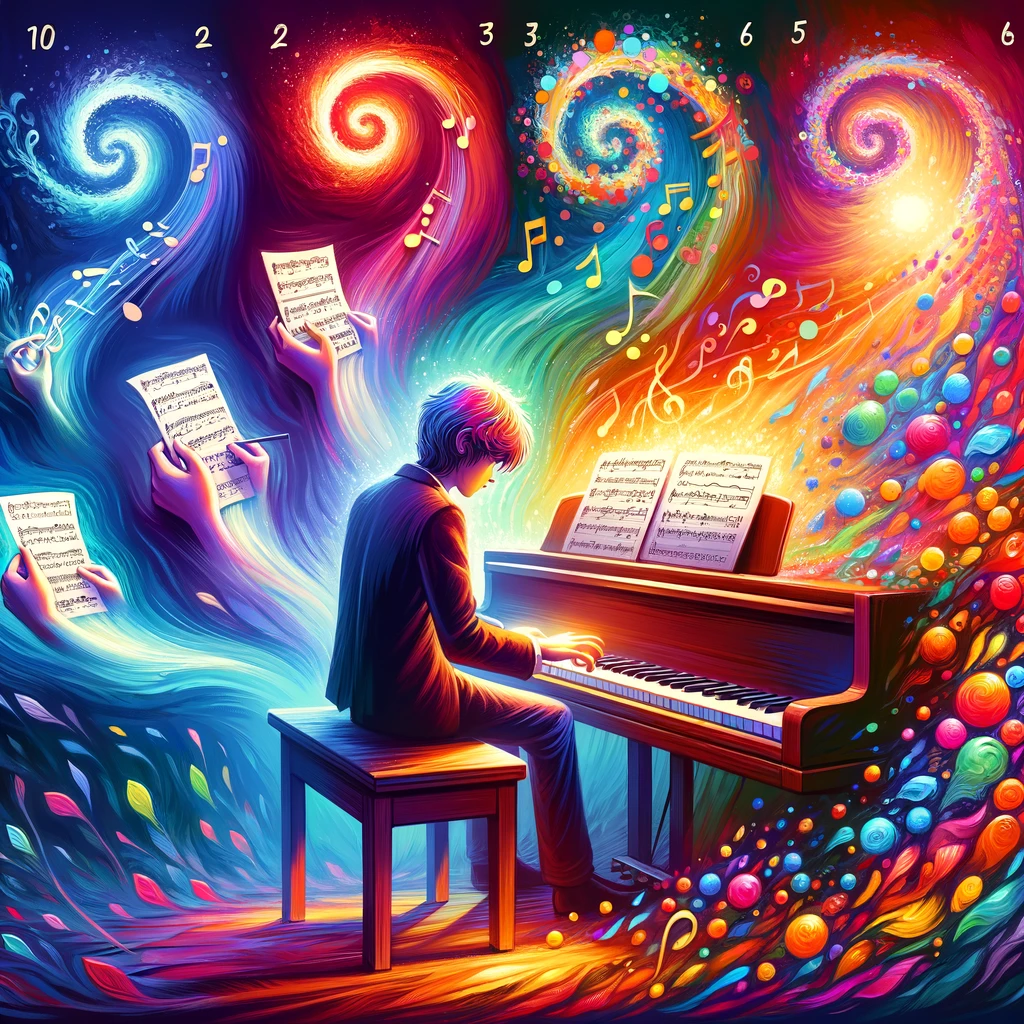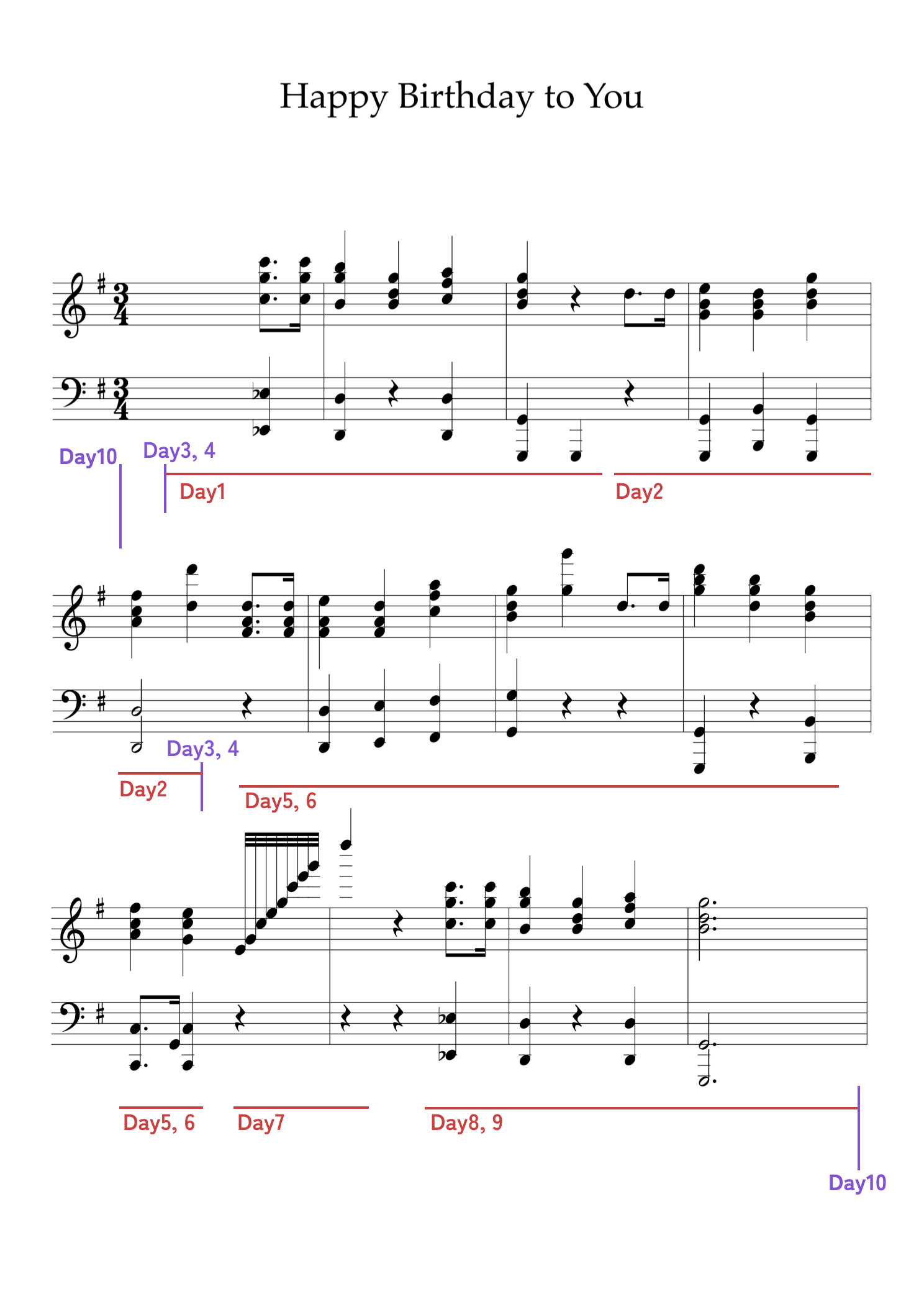PT2 Program: Learn to Play the Piano in 10 Days

you can download the app here.
Welcome to the PT2 Program
Welcome to the PT2 (Playing The Piano in Ten Days) program. This program is designed to help beginners and those with no experience to overcome the initial hurdles of playing the piano. The goal of this program is to help you learn to play "Happy Birthday to You" in 10 days.
Why "Happy Birthday to You"?:
This song is likely familiar to everyone around the world. It can serve as motivation to play for loved ones, such as family or a significant other. Moreover, the song is short and focuses on the well-known melody, making it easier for beginners to play.
Although it is relatively easy, some may struggle with reading sheet music. To solve this issue, we developed the GrandScore app.
After entering the sheet music, the app visualizes it as shown above. Each pitch is colored differently, such as "C" being red, and the length of the falling bars indicates note duration. Even if you don't understand sheet music or musical notation, you'll know which key to press and for how long at a glance.
The song "Happy Birthday to You" comes pre-installed in the app, so you can skip the sheet music input step and start practicing right away.
The 10-Day Plan
Here's an overview of the 10-day plan. After grasping the overall flow, we'll go into the details of each step. The plan is as follows:
- Practice the right-hand part measure by measure, memorizing the finger movements.
- Practice the left-hand part measure by measure for the measures learned with the right hand.
- Practice both hands together measure by measure.
- Repeat steps 1 to 3 until you can play the entire piece.
In most songs, the right hand handles the melody. Starting with the melody part helps you play familiar sounds, boosting motivation.
Next is the left-hand practice. Playing different movements with both hands is a major hurdle for new pianists. Unfortunately, there's no shortcut to overcome this, and practice is essential. While software can assist with sight-reading, this part requires effort.
However, here are some tips to overcome this hurdle:
- Memorize the movements of each hand separately until you can play them without thinking.
- Try playing one hand unconsciously while focusing on the other.
- If you get bored, play the right-hand melody part of the next measure for a change.
Handling boredom is crucial. If you struggle with playing both hands, switch to the right-hand part of the next measure for a change. It's enjoyable to play melodies.
Interestingly, you will learn to play both hands separately "without realizing it." Even if you can't do it today, you might be able to tomorrow, so persistence is key.
Day 1 to Day 10
Next, we outline the detailed schedule for each day. The list below shows the minimum practice content for each day.
- Day 1: Practice the right and left hand separately for measures 1 to 3.
- Day 2: Practice the right and left hand separately from part of measure 3 to part of measure 5.
- Day 3: Practice the right and left hand separately for measures 1 to part of measure 5.
- Day 4: Practice playing both hands together for measures 1 to part of measure 5.
- Day 5: Practice the right and left hand separately for measures 5 to part of measure 9.
- Day 6: Practice playing both hands together for measures 5 to part of measure 9.
- Day 7: Practice the consecutive notes in measure 9.
- Day 8: Practice each hand separately for measures 10 to 12.
- Day 9: Practice playing both hands together for measures 10 to 12.
- Day 10: Practice playing all measures (1 to 12) continuously.
The schedule is also noted on the actual score.

The schedule covers the minimum practice because:
- Practice time might be limited.
- Progress and memory vary from person to person.
If Day 1's practice (measures 1 to 3) goes smoothly, you can move ahead to Day 2's content. If Day 4's "playing with both hands" doesn't go well, you can review on Day 5 or Day 7.
This schedule allows for review and preview based on your progress.
Practice Support Features
The GrandScore app offers free sheet music visualization. While this is already useful, the paid plan for 980 yen/month provides additional practice support features.
Slow Playback:
Practicing at a slower tempo is very effective. However, few services offer slow playback for your specific practice piece.
GrandScore, which supports individual practice, provides this essential feature.
Start at a slow tempo and gradually increase speed to improve accuracy.
Section Playback:
In piano practice, focusing on unfamiliar or difficult measures is very effective.
Normally, playback starts from the beginning, but the section playback feature allows you to start from any part of the score.
Loop Playback:
This is an extension of section playback. It allows you to loop specific measures.
Repetitive practice is crucial, and this feature enhances its efficiency.
Ready to Start
This program helps beginners and novices enjoy playing the piano. Some parts require efficiency, while others need consistent practice, but overcoming the latter brings a special sense of accomplishment.
Now, it's time to start.